Indian parliament passes bill feared to lead to seizure of mosques
The controversial bill requires Waqf boards to obtain district-wide approval in order to confirm land ownership, sparking fears this could lead to wide government-led seizure of mosques for the land they're built on.
-

Muslims gaze out the window after performing the afternoon prayers at the mosque in Mumbai, India, on Friday, April. 4, 2025. (AP)
The Indian parliament has passed a controversial bill that seeks to overhaul the laws governing Muslim religious endowments despite facing strong opposition from the Muslim community and opposition parties.
Following a 12-hour debate that stretched into early Friday, the Rajya Sabha, India's Upper House of Parliament, approved the contentious legislation with 128 votes in favor and 95 against, after the Lok Sabha, the Lower House, had passed the bill a day earlier with 288 members supporting it and 232 opposing it.
The bill is set to be presented to Indian President Droupadi Murmu for the government's final assent before being enacted into law.
The bill, introduced by Prime Minister Narendra Modi's Hindu nationalist government, seeks to modify regulations governing Muslim charitable organizations and religious endowments estimated to be worth over $14 billion, sparking fears particularly over its new property validation requirements.
These validation requirements raised concerns because many of India's historic mosques, shrines, and graveyards, established through waqf endowments centuries ago, currently lack formal documentation due to the absence of legal records from that era.
Critics have raised alarms that the bill's requirement for waqf boards to secure district-level approval to validate land ownership could potentially open doors to government-supported property seizures and prolonged legal battles, with these fears being further amplified by recent assertions from hardline Hindu groups alleging that some historic mosques were built atop former Hindu temple sites.
Opposition outraged
Senior Congress leader Jairam Ramesh stated that the party would soon file a petition in the Supreme Court challenging the constitutional validity of the Waqf Bill.
Mallikarjun Kharge, the leader of opposition in the Rajya Sabha (India's Upper House), criticized the ruling Bharatiya Janata Party government for promoting division by targeting Muslims through the Waqf Bill, which he labeled as "unconstitutional" and harmful to Indian Muslims, while urging its withdrawal due to numerous "mistakes" in the legislation.
Opposition leader, Rahul Gandhi condemned the bill as "a weapon aimed at marginalizing Muslims and usurping their personal laws and property rights," warning in a Wednesday post on X that while the legislation targets Muslims today, it sets a dangerous precedent for future attacks on other communities.
Muslim organization and leaders expressed their outrage at the bill. Jamaat-e-Islami Hind (JIH) President Syed Sadatullah Husaini denounced the bill as "a highly condemnable move" and "a dangerous precedent" that could enable broader legislative discrimination against Muslims.

 3 Min Read
3 Min Read










